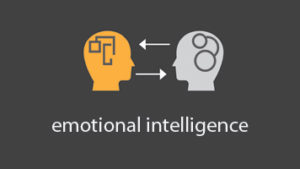Learn How to Assess Emotional Intelligence During the Hiring Process (And Why You Should)
College degree? ✓
Experience in the field? ✓
Emotional intelligence?…
Do you know how to assess emotional intelligence when interviewing a job applicant? If not, you could be hiring the wrong candidates. Learn how to spot emotional intelligence during the recruitment process and how to encourage its development in your current employees as well.
What Is Emotional Intelligence and Why Is it Important?
Emotional intelligence is the ability to recognize, understand, manage, and reason with one’s emotions and those of others. Having a high level of emotional intelligence helps someone to make decisions, solve problems, and communicate on a deeper and more effective level.
Asking employees to leave their baggage outside the office door is easier said than done. Suppression only works for so long. Emotions are bound to pop up or develop at work. Imagine the different outcomes between a team who knows how to interpret and appropriately respond to emotion and a team who recklessly reacts.
If you want to encourage internal growth, hiring candidates who demonstrate the telltale signs of emotional intelligence is crucial. According to Dr. Travis Bradberry, 90% of top performers have high levels of emotional intelligence, and nearly 60% of an employee’s job performance is directly related to emotional intelligence. If you want a team that communicates, reads, and responds to the needs and emotions of clients and coworkers, focus on hiring candidates with high levels of emotional intelligence.
How to Assess Emotional Intelligence During an Interview
Just as you read a candidate’s resume and body language, there are several questions you can ask during an interview to assess a candidate’s emotional intelligence. Here are three to consider.
Can you think of a person on whom you’ve had a positive impact?
People with high levels of emotional intelligence notice the struggles in other people’s lives and understand how they can help, even if it’s just lending an empathetic ear. Their answer to this question should let you know if they understand social cues and appropriate responses.
How have you had to adapt in previous positions or life situations?
Ideally, a candidate will have several examples to share with you. Having emotional intelligence allows individuals to be highly adaptable as they read their new surroundings or situation. This makes them a versatile employee who can quickly recover from change.
What are your work-related pet peeves?
Be wary of a candidate who answers with a safe or shallow answer. Everyone has something that irks them. An applicant with emotional intelligence should be able to reveal small frustrations but also how they overcame or adjusted to them. For example, you may have an applicant reveal that they dislike coworkers with bad breath, so they keep a bowl of mints on their desk.
How to Further Develop Emotional Intelligence in Current Employees
If you currently have team members who struggle when dealing with emotions, here are a few tips.
Hold a workshop
Whether you outsource the workshop or develop your own, make it a friendly and inviting experience with plenty of resources from which employees can learn.
Keep the discussion open
Also, make emotional intelligence part of your work culture. Employees should feel comfortable discussing and embracing the ability.
Lead by example
Are you a team leader with a hot head? Do you shy away when a coworker is having a rough day? Practice self-awareness and work on your own emotional intelligence.
If it’s not already, assessing emotional intelligence should be a part of your interview protocol. Recognizing and hiring candidates with high levels of emotional intelligence can positively influence your work culture, performance levels, and overall brand.
Learn how Tandem HR can grow your business. Call 630.928.0510 or fill out the form and one of our Business Development Managers will contact you.
We’re not the only ones excited about our customizable, high-touch approach to human resources. Check out this powerful testimonial about the impact of our solutions.
https://youtu.be/Os7GPI2jr3I

